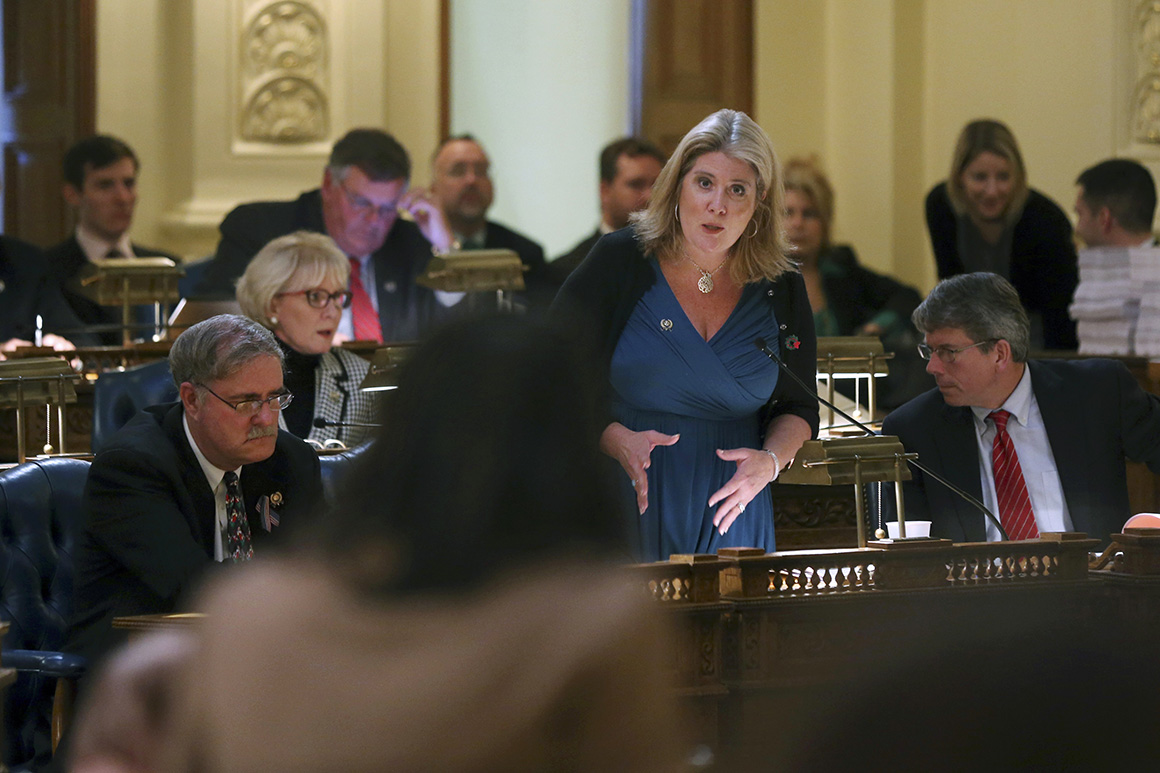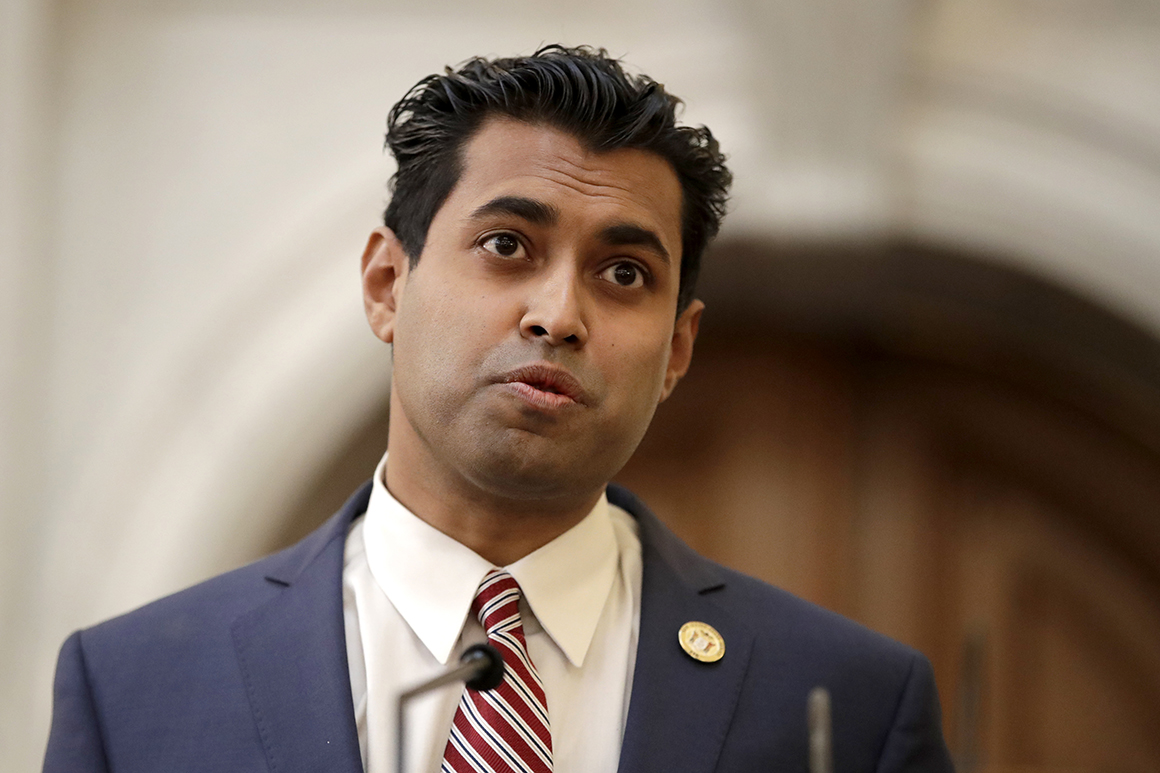
New Jersey state Sen. Holly Schepisi was lying in bed when she first read the sample lessons one school district was considering incorporating into its sex education curriculum.
The Republican lawmaker said she began clicking on links included in the sample lesson plans — “digging deeper,” she said — and soon found herself down a YouTube rabbit hole watching recommended videos from a sex ed advocacy organization geared toward kids of various ages. The videos described how many times a day is OK to masturbate, how to properly put on a condom and how watching pornography is “normal” but that it does not reflect reality. Schepisi posted a link to the proposed lesson plans on Facebook, writing, “I truly think New Jersey has lost its damn mind.”
That single post set off a national firestorm of conservative media coverage promoting Republican lawmakers who said revisions to New Jersey’s comprehensive health and physical education learning standards, which were adopted in 2020, were “unnecessarily sexualizing children” and “indoctrinating” students with “extreme views on gender identity and sexual orientation.”
That narrative is not true. The sample lesson plans Schepisi spread were not mandated by the state, and the school system in question — more than 40 miles away from Schepisi's legislative district in northern New Jersey — did not adopt them as written. Another district did adopt some of the broader curricula the lesson plans came from, but it has been using those lessons for four years with little community pushback.
Nevertheless, some Republicans in deep blue New Jersey seized on the issue and are using rhetoric that plays on parents' fears — the type of talk that’s already gained popularity in more conservative states like Virginia and Florida — to motivate suburban voters ahead of the midterms. The move put Democrats on their heels, forcing Gov. Phil Murphy to repeatedly address the complaints and, eventually, order education officials to clarify what’s covered under the state’s sex ed standards.

This week, state Sen. Vin Gopal, a Democrat who represents a competitive legislative district, said he plans to introduce legislation that would increase transparency around curriculum decisions and give parents greater involvement in the lesson planning process.
“This is a coordinated attempt by political operatives whose goal is to create chaos, misinformation and try to cause confusion for people,” Gopal, the chair of the state Senate’s Education Committee, said in an interview. “I do wish that the [state] Department of Education and the other side would do a better job as far as taking control of the narrative, making sure the truth is more widely available, and not giving in to the conspiracy theorists.”
New Jersey is just the latest — if unexpected — battleground in the national debate about what students are taught in school. In Virginia, inflaming parents over critical race theory helped elect Republican Glenn Youngkin governor. In Florida, Republican Gov. Ron DeSantis is trumpeting the “Parental Rights in Education” bill, dubbed the “Don’t Say Gay” law by opponents, as he runs for reelection and considers seeking the GOP presidential nomination in 2024.
In New Jersey, sex education became a wedge issue during last year’s closer-than-expected gubernatorial election — though Republican nominee Jack Ciattarelli ultimately pulled away from school curriculum and leaned more heavily into the debate about property taxes, a reliable GOP pain point in the state. Murphy won reelection, though narrowly.
There's no law or policy in New Jersey that mandates teaching kindergartners or second graders about sex acts. There's no law or policy that mandates instructing elementary school students about gender transition-related medical care. And there's no law or policy that mandates teaching students younger than 13 about the existence of pornography.
But Democrats’ efforts to correct the record have been sporadic and slow, while Republicans last week were publishing three to four press releases a day, tweeting their outrage and making appearances on Fox News to keep the narrative alive.
“You can't fact check fantasy. This is not a real thing. It’s madness,” Joseph Ricca, a school superintendent and member of the state Board of Education, said in an interview. “Party cannot supersede reality. And I think in some cases, unfortunately, there's the temptation to sort of exit reality and get into an echo chamber where we're all just yelling and screaming about things.”
If parents are concerned, “talk with your local superintendent. Talk with your school board. Talk with your child's teachers," said Ricca, a Republican. "The politicians know nothing about education.”
Changing standards
The increased attention on the Florida law that bars instructions on gender identity and sexual orientation with the youngest students, along with mainstream society’s increased awareness and acceptance of LGBTQ people, has brought a renewed focus on the curriculum standards in New Jersey.
But what those standards actually say has been largely ignored as partisans pick out examples from sample lesson plans — and overlook the fact New Jersey parents have always had a right to opt their children out of sex ed lessons.
Murphy signed two laws in 2019 and 2021 that require middle and high school students be taught about the societal contributions of LGBTQ people and people with disabilities and highlight and promote “diversity of gender and sexual orientation, race and ethnicity, disabilities, and religious tolerance” to students in grades K-12.
Between those signings, the state Board of Education released revised student learning standards that include provisions saying students should be able to define oral, vaginal and anal sex by eighth grade. By fifth grade, teachers should “explain common human sexual development and the role of hormones (e.g., romantic and sexual feelings, masturbation, mood swings, timing of pubertal onset)” and second graders should be able to “discuss the range of ways people express their gender and how gender-role stereotypes may limit behavior.”
The Republican uproar was caused less by those standards than the sample lesson plans that are available to help school districts meet the state guidelines. There is some truth at the molten-hot core of Republicans' argument. The proposed lesson plans that sparked the controversy came from an advocacy group, Advocates for Youth, with a stated left-leaning progressive mission to "shift the current cultural paradigm in which we live from one that too often stigmatizes youth and youth sexual development to one that embraces youth as partners and recognizes sexuality as normal and healthy."
Schepisi pointed out on Twitter that there are relatively few sample lesson plans offered by advocacy groups that comply with the state standard requirements. Schools, she said, may "feel compelled to pick from the limited menu of options that are currently available.”
But Republicans’ claims the lesson plans are evidence of Democrats pushing a “woke agenda” on children is not accurate either.
When the state Board of Education added mention of gender identity to statewide standards in 2020, 10 of 13 members on the board had been appointed by or signed-off on by Republican Gov. Chris Christie. The vote on the revised standards was 9-4, with four Christie-appointed board members opposed and six in favor.
It was also Christie who, in 2017, signed legislation adding protections for transgender students to state education guidelines.
Despite the fact that the 2020 standards are, in large part, very similar to what was in place under his administration, Christie took to Twitter last week saying "these new standards need to be revoked and start over. Don’t let the state distract parents from insuring that our young children are not exposed to these new standards."
Republican messaging
After Schepisi first made her social media post about the sample lessons, it quickly became fodder for conservative blogs and Fox News guests who spent days falsely claiming first- and second-graders in the state are being subjected to “psychological torture” and “predatory grooming,” language that’s been repeated by adherents to the Q Anon conspiracy theory and some conservatives supporting legislative efforts to roll back rights and protections for LGBTQ people.
While Republican-elected officials in New Jersey have avoided the term “grooming,” their Twitter and Facebook comment feeds are rife with unfounded accusations of pedophilia and child abuse against Democrats, school leaders and the media.
New Jersey GOP strategist Chris Russell said those kinds of extreme right-wing buzzwords aren’t effective in the state and don't resonate with the typical New Jersey Republican voter who leans more socially moderate, but he said Republicans should still find a way to tap into that parental outrage.
“When it drifts into fringe messaging on our side about grooming, that doesn't do anything to advance our argument. In fact, I think it probably gives people like Phil Murphy the hammer they're looking for to beat arguments down,” said Russell, who was Ciattarelli’s top adviser during the 2021 gubernatorial campaign.
Still, Russell said Republicans “would be really wise” ahead of the congressional midterms this year and the legislative elections in New Jersey next year to “absolutely, lean into these things” — just “talk about them in a way that is appealing to a broader group of people.”
Though there’s no chance New Jersey will be getting its own Florida-style law prohibiting classroom lessons on gender identity or sexual orientation while the state remains under Democratic control, lawmakers are already introducing a slew of bills that would give parents more control over curriculum decisions.
New Jersey Republican Sen. Ed Durr proposed legislation that would prohibit classroom instruction on sexual orientation or gender identity and would allow parents to sue teachers and schools for alleged violations, damages or attorney’s fees.
Other lawmakers introduced a bill that would require parental consent for any student to participate in any health, family life education or sex education program, another measure to make curriculum details publicly available to parents and a third that would eliminate the statewide learning standards altogether — including standards for subjects like math, literacy and science.
Schepisi and other Republicans say the state standards “go too far” and need to be revisited.
“There’s a big difference between teaching kids to be loving, kind, accepting to kids who feel they may be transgender and providing appropriate resources. But we’ve now gone to the other extreme of convincing kids that they may be something they are not,” Schepisi said. She said her sister was a “tomboy” growing up and recently told the lawmaker “if I grew up in the current climate, I think somebody would try to convince me I’m transgender at this point.”
Schepisi’s point about concerns schools are “convincing kids they may be something they are not” is a well-documented but unfounded myth about transgender people.
Still, parental uncertainty about how young is too young to be talking about transition-related medical care is not exclusive to Republicans and arises from a larger societal debate about how we discuss, sensationalize and obsess over trans people and their bodies.
It’s not “confusing” to teach kids about acceptance and the concept of varying gender identities, said Eva Goldfarb, a researcher at Montclair State University who studied 30 years of sex education literature and helped co-author some of the lesson plans Schepisi and others found inappropriate.
“It's not that kids through the age of eight are not going to be exposed to ideas about gender and gender identity and gender expression and sexual orientation, because it's all around them in the world, in the culture at large,” Goldfarb said in an interview. “By four years old, virtually all kids have a sense of their gender identity ... they have ideas about what girl things are or boy things are and they're going to have questions and they’re going to be curious.”
----------------------------------------
By: Carly Sitrin and Matt Friedman
Title: How Republicans in blue New Jersey are fueling a new debate over sex ed
Sourced From: www.politico.com/news/2022/04/22/republicans-new-jersey-sex-ed-00025865
Published Date: Fri, 22 Apr 2022 03:30:00 EST






